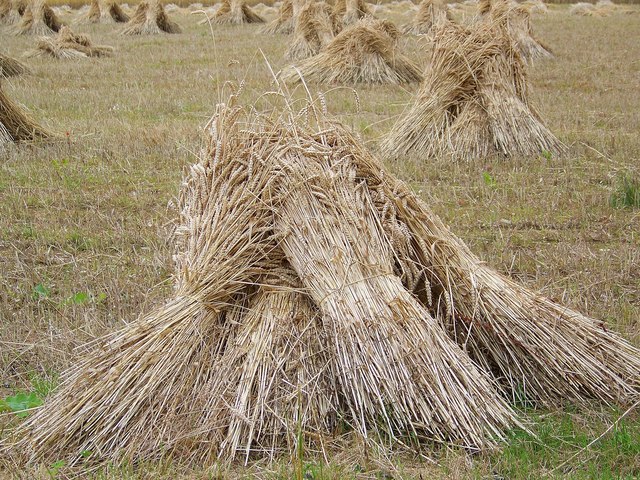
noun
- plural of sheaf.
noun
- plural of sheave2.
noun, plural sheaves.
- one of the bundles in which cereal plants, as wheat, rye, etc., are bound after reaping.
- any bundle, cluster, or collection: a sheaf of papers.
verb (used with object)
- to bind (something) into a sheaf or sheaves.
verb (used with object), sheaved, sheav·ing.
- to gather, collect, or bind into a sheaf or sheaves.
noun
- a pulley for hoisting or hauling, having a grooved rim for retaining a wire rope.
- a wheel with a grooved rim, for transmitting force to a cable or belt.
noun
- the plural of sheaf
verb
- (tr) to gather or bind into sheaves
noun
- a wheel with a grooved rim, esp one used as a pulley
noun plural sheaves (ʃiːvz)
- a bundle of reaped but unthreshed corn tied with one or two bonds
- a bundle of objects tied together
- the arrows contained in a quiver
verb
- (tr) to bind or tie into a sheaf
n.Old English sceaf (plural sceafas) “large bundle of corn,” from Proto-Germanic *skauf- (cf. Old Saxon scof, Middle Dutch scoof, Dutch schoof, Old High German scoub “sheaf, bundle,” German Schaub “sheaf;” Old Norse skauf “fox’s tail;” Gothic skuft “hair on the head,” German Schopf “tuft”), from PIE root *(s)keup- “cluster, tuft, hair of the head.” Extended to bundles of things other than grain by c.1300. Also used in Middle English for “two dozen arrows.” General sense of “a collection” is from 1728. v.“to gather up in sheaves,” 1570s; see sheaf. Related: Sheaved; sheaving. Earlier verb in this sense was simply sheaf (c.1500). n.“grooved wheel to receive a cord, pulley” (mid-14c.), also “slice of bread” (late 14c.), related to shive (n.).
 Liberal Dictionary English Dictionary
Liberal Dictionary English Dictionary